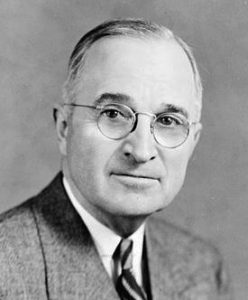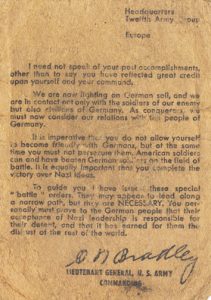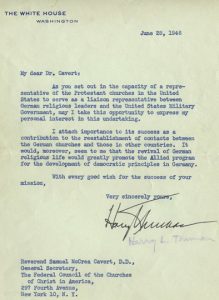V-E (Victory in Europe) Day is commemorated on May 8, 1945. One day earlier, German forces unconditionally surrendered to the Allies, signaling the end of most fighting in Europe — although fighting would continue against Japan for an additional 3 months.
 President Harry Truman addressed the nation, reading his proclamation calling for a day of prayer. (WallBuilders’ collection includes an original printing of this proclamation, signed by President Truman.) Truman’s proclamation acknowledged the work of God in winning the war and the continuing need for His help:
President Harry Truman addressed the nation, reading his proclamation calling for a day of prayer. (WallBuilders’ collection includes an original printing of this proclamation, signed by President Truman.) Truman’s proclamation acknowledged the work of God in winning the war and the continuing need for His help:
For the triumph of spirit and of arms which we have won, and for its promise to peoples everywhere who join us in the love of freedom, it is fitting that we, as a nation, give thanks to Almighty God, who has strengthened us and given us the victory.
Supervision over transitioning post-war Germany was divided among four major Allied nations — France, England, the Soviet Union, and the US. General Omar Bradley, commander of the Twelfth Army Group, oversaw the region leading up to the post war transition. He issued special orders (found in WallBuilders’ collection) that provide an interesting glimpse into American policy concerning Germany during this time:
4. To avoid acts of violence, except when required by military necessity.
For you are on American soldier, not a Nazi.
7. To be fair but firm with Germans.
a. Experience has shown that Germans regard kindness as weakness. Every soldier must prove by his actions that the Americans are strong. This will be accomplished if every soldier treats the Germans with firmness and stern courtesy at all times.
b. Firmness must be tempered with a strict justice. Americans do not resort to Nazi gangster methods in dealing with any people. Remember, your fair but firm treatment of the German people will command the proper respect due a member of a conquering nation.
Part of the rebuilding of Germany included pointed efforts to institute democratic policies, as demonstrated in a June 1946 letter by President Truman to a minister. (This letter is also in WallBuilders’ collection.)
As you set out in the capacity of a representative of the Protestant churches in the United States to serve as a liaison representative between German religious leaders and the United States Military Government, may I take this opportunity to express my personal interest in this undertaking.
I attach importance to its success as a contribution to the reestablishment of contacts between the German churches and those in other countries. It would, moreover, seem to me that the revival of German religious life would greatly promote the Allied program for the development of democratic principles in Germany.
The actions of America after fighting in Europe ended affirm that we openly embraced religious principles as part of our public policy — that America did not consider itself a secular nation. This is a lesson worth remembering today, and should encourage us to push back against efforts to secularize the country, whether those efforts occur at a local school or in the Supreme Court of the United States.
Still looking for answers? Visit our FAQ page
More Resources
Know the Truth and Protect Your Freedoms.
Still looking for answers? Visit our FAQ page
Stay Informed with the Latest Resources
Enter your email address to receive our regular newsletter, with important information and updates right in your inbox!

 4. To avoid acts of violence, except when required by military necessity.
4. To avoid acts of violence, except when required by military necessity. As you set out in the capacity of a representative of the Protestant churches in the United States to serve as a liaison representative between German religious leaders and the United States Military Government, may I take this opportunity to express my personal interest in this undertaking.
As you set out in the capacity of a representative of the Protestant churches in the United States to serve as a liaison representative between German religious leaders and the United States Military Government, may I take this opportunity to express my personal interest in this undertaking.








